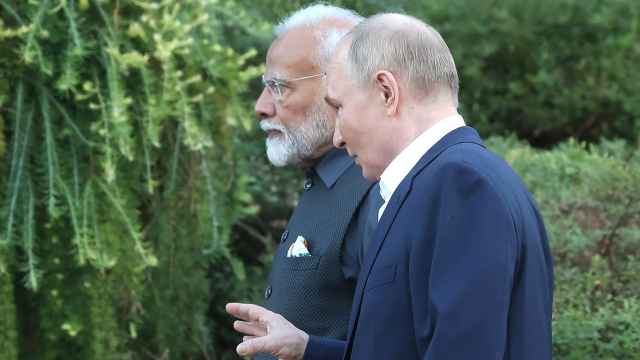When presidents Vladimir Putin and Xi Jinping signed their May 21 gas deal, everybody saw it essentially through the prism of the Ukrainian crisis.
While these considerations indeed played a significant role in bringing about the expedient conclusion of 10 years of negotiations, it may be that commercial and geographic interests played a greater role than politics did.
There are six factors that played key roles in the rapid advancement of this deal:
1. "It's geography, stupid."
Why go to China? One reason is that east Siberian gas is too far away from Europe but local gas demand is too low to otherwise justify development of the Chyanada and Kovykhta fields. China, however, with its booming economy and rapidly increasing usage of natural gas, seems to be the perfect client for Gazprom.
The geographical imperative also played an important role in China's decision to go ahead with the gas deal— the Power of Siberia pipeline will go directly into north-east China, which has a particularly high natural gas demand.
Energy security also plays an important role in China's foreign policy. Most of the gas imported by Chinese energy companies either must cross several Central Asian states or to be transported in the form of liquefied natural gas (LNG) via unprotected sea-lanes and easily closed "choke points" such as the Ormuz Strait in the Persian Gulf or the Strait of Malacca in the Southeast Asia.
Therefore, from a security of supply point of view, Russian gas allows China to mitigate the transport risk and to diversify imported energy supplies.
2. Gazprom needs new markets.
Russia's internal market is oversupplied with natural gas, with the glut amounting to about 20 to 30 billion cubic meters of supply per year. Several factors have contributed to this surplus.
Firstly, slower industrial growth, particularly in Russia's energy-intensive industries, sent annual gas consumption sharply down. In 2011, demand was 496.3 bcm, compared to last year's record of just 456.3 bcm.
While Gazprom's exports to Europe rose unexpectedly last year to a record of 162.7 billion bcm, it continued to shed market share in Russia, which fell by about 6 percent during the course of 2012.
Over-regulated European gas markets also offer little attraction for investors and energy suppliers. European Union internal gas consumption is also unlikely to grow fast, at least in the years to come.
Present market conditions coupled with often-excessive subsidies for renewables renders the immediate future for gas in Europe rather bleak. On the contrary, natural gas consumption in Asia is set to grow as the region's economies expand.
3. The deal helps Russia's trade deficit.
China is Russia's single largest trade partner. The trade between the two countries accounted for $90 billion in 2013, and is set to increase to $200 billion by 2020.
Russia has a surplus in trade with its main commercial partners — the EU, Turkey, Ukraine, the U.S. and Japan — but not with China. In 2013, Moscow had a $10 billion trade deficit in its trade with Beijing and this gap is rapidly widening. Gas exports to China will help to offset growing imbalances in the trade relations between the two countries.
4. China desperately needs gas.
In 2012, the Chinese government released its Five-Year Plan for the development of unconventional gas, setting ambitious production targets. Shale gas production is set to grow from 6.5 bcm per year in 2015 to at least 60 bcm per year in 2020.
Progress in shale gas development, however, is compromised by the difficult geological structure of China's shale gas reservoirs, lack of water supplies for fracking activities and a still insufficient technological base.
Furthermore, China's gas consumption is growing at a faster rate than forecasted — the country's natural gas use increased by 13.9 percent to 167.6 bcm last year and this number is expected to reach 186 bcm by the end of 2014. In these circumstances, Beijing is forced to use all possible sources of gas, whether they might be domestically produced or bought abroad.
5. The gas deal might boost GDP.
China is expected to pay for Russian gas at a rate of $10.5 million to $11 per million British thermal unit (BTU) or $370 to $390 per thousand cubic meters. This is significantly cheaper than what Chinese companies are currently paying for their LNG imports.
Russia's economy will also benefit from this deal. According to Bank of America's report released on May 27, 2014, the Russia-China gas project will boost investment in Russia's otherwise stagnating economy and might increase its' GDP growth to 2.1 percent in 2015.
6. Russia needs to ally with China.
Over the last decade the global economic balance has rapidly shifted towards the Asia–Pacific region, with China becoming the world's leading economic power. Washington was quick in responding to this shift, by partially "switching" to Asia.
Until now Moscow had little to offer China except rhetoric. Last year's Rosneft deal and Gazprom's contract were the first real steps towards a more Asia-focused policy. Indeed, it would have been strange to see two neighboring countries — China, the world's largest energy consumer and Russia, the world's largest energy exporter — being engaged in anything other than a full-scale energy trade.
Danila Bochkarev is senior fellow at the EastWest Institute (EWI) in Brussels. The views expressed are his own. An initial version of this article was published on EWI's website.
A Message from The Moscow Times:
Dear readers,
We are facing unprecedented challenges. Russia's Prosecutor General's Office has designated The Moscow Times as an "undesirable" organization, criminalizing our work and putting our staff at risk of prosecution. This follows our earlier unjust labeling as a "foreign agent."
These actions are direct attempts to silence independent journalism in Russia. The authorities claim our work "discredits the decisions of the Russian leadership." We see things differently: we strive to provide accurate, unbiased reporting on Russia.
We, the journalists of The Moscow Times, refuse to be silenced. But to continue our work, we need your help.
Your support, no matter how small, makes a world of difference. If you can, please support us monthly starting from just $2. It's quick to set up, and every contribution makes a significant impact.
By supporting The Moscow Times, you're defending open, independent journalism in the face of repression. Thank you for standing with us.
Remind me later.






